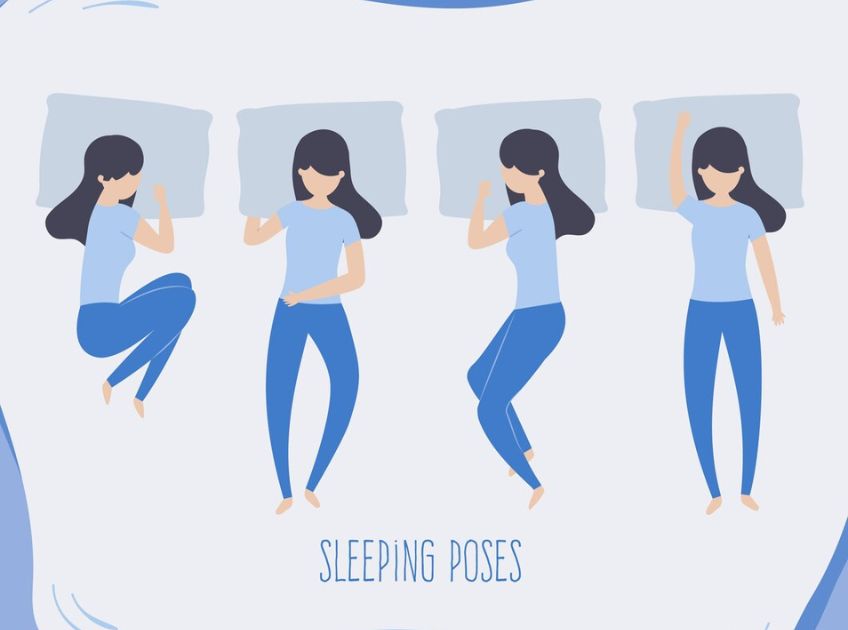
Important: This article is for informational purposes only. Please read our full disclaimer for more details.
The way you sleep can influence how well your body digests food overnight. Poor posture may trigger acid reflux, bloating, and discomfort, while the right position can promote smoother digestion. Studies have shown that certain angles help food move efficiently through the digestive tract, reducing acid backflow and supporting gut health (1).
Best Sleeping Positions for Healthy Digestion
The way you position your body during sleep directly impacts how your digestive system works overnight. Gravity, organ placement, and muscle relaxation all play a role in how smoothly food moves through your digestive tract. Below are the most recommended positions backed by research and expert opinion:
1. Left Side Sleeping – The Gold Standard for Digestion
Sleeping on your left side is considered the best position for digestive health. This posture takes advantage of the way your stomach and intestines are naturally arranged. The stomach sits on the left side of the body, and when you lie on your left side, gravity helps keep the stomach contents lower than the esophagus.
- Why it helps: A study published in The Journal of Clinical Gastroenterology found that left-side sleeping significantly reduces acid reflux episodes at night (2). It also supports better bowel movement by aligning the intestines naturally.
- Who benefits most: People dealing with GERD, heartburn, or indigestion see the greatest relief with this position.
2. Slightly Elevated Back Sleeping – Gentle Support for Acid Reflux
If you’re a back sleeper, lying completely flat isn’t ideal for digestion. However, slightly elevating your upper body with a wedge pillow or adjustable bed frame can make a big difference. Raising your torso by 6–8 inches uses gravity to keep stomach acid from creeping up into the esophagus.
- Why it helps: According to research in The American Journal of Gastroenterology, elevation reduces nighttime acid reflux in GERD patients and allows smoother gastric emptying (3)(4).
- Extra tip: Avoid stacking multiple pillows under your head; this can strain the neck. A wedge or adjustable incline is more effective.
3. Loose Fetal Position – Gentle on the Gut
Sleeping in a curled-up, fetal-like position on your left side is another excellent option. This posture relaxes abdominal muscles and can ease the passage of gas through the intestines, reducing bloating and discomfort.
- Why it helps: The slight curl reduces pressure on the stomach while keeping the digestive tract aligned. It’s especially soothing for people who experience gas or mild cramping at night.
- Extra tip: Keep the curl loose; overly tight positions can compress organs and restrict breathing.
4. Combination Approach – Switching Between Left and Elevated Back
Some people find alternating between left-side sleeping and a slightly elevated back position helpful, especially those with severe acid reflux. This combination allows relief while reducing pressure on one side of the body throughout the night.
- Why it helps: Switching positions minimizes stiffness while maintaining digestion-friendly postures.
- Extra tip: If you’re a restless sleeper, using a body pillow can help you stay on your left side for longer periods.
Positions You Should Avoid at Night
- Sleeping on the Right Side:
According to studies, this can relax the lower esophageal sphincter (5), increasing the risk of acid reflux. - Flat on Your Back After a Heavy Meal:
Lying flat may cause stomach acid to move upward, leading to heartburn and discomfort. - Sleeping on the Stomach:
This can put pressure on abdominal organs and disrupt natural digestion patterns.
Nighttime Tips to Ease Acidity and Boost Digestion
Making small adjustments to your evening routine can significantly improve digestion and reduce nighttime discomfort. Here are some expert-backed tips to follow:
- Eat Your Last Meal Early: Aim to finish dinner at least 2–3 hours before lying down. This gives your stomach time to process food and reduces the risk of acid reflux while you sleep.
- Choose Lighter, Digestive-Friendly Foods: Opt for balanced meals that are easy to digest, avoiding heavy, spicy, or overly fatty dishes at night, as these can slow gastric emptying and trigger heartburn.
- Elevate Your Upper Body: Slightly raising the head of your bed or using a wedge pillow helps gravity keep stomach acid from moving upward. Studies show even a 6-inch elevation can reduce reflux episodes.
- Sleep on the Left Side After Eating: If you must lie down soon after a meal, turning to your left side minimizes acid backflow due to the stomach’s natural position in the body.
- Limit Late-Night Beverages: Large amounts of water or caffeinated drinks right before bed can create pressure in the stomach and worsen acid reflux. Take small sips instead of full glasses.
- Manage Stress Before Sleep: High stress levels can trigger indigestion. Gentle stretching, deep breathing, or meditation before bed can help relax your digestive system.
- Wear Loose, Comfortable Clothing: Tight waistbands or restrictive sleepwear can put extra pressure on the abdomen, making acid reflux and bloating worse.
Frequently Asked Questions (FAQ’S)
1. Is it true that sleeping on the left side is best for digestion?
A. Yes. Several studies, including one in The American Journal of Gastroenterology, show that left-side sleeping reduces acid reflux by positioning the stomach and esophagus to minimize acid backflow.
2. Can poor sleeping posture cause bloating?
A. Yes. Sleeping in positions that compress the stomach or intestines can slow digestion and trap gas, causing bloating and discomfort.
3. How long should I wait to lie down after eating?
A. Experts recommend waiting at least 2–3 hours after a meal before lying down to allow proper digestion and reduce acid reflux risk.
Your sleeping position can make a significant difference in digestion and gut comfort. Left-side sleeping and slight elevation are the most beneficial, while right-side and stomach sleeping may worsen symptoms like acid reflux. Combine the right posture with smart nighttime habits for optimal digestive health and restful sleep.















